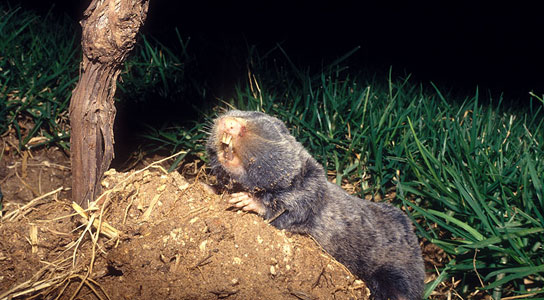Blind Mole Rats May Hold Cellular Clues to Effective Treatments for Cancer
November 6, 2012

Palestine mole rat, image via Wikipedia
New cell cultures from two species of blind mole rats, Spalax judaei and Spalax golani, behave in ways that render them impervious to the growth of tumors.
The scientists published their findings in the journal PNAS. Vera Gorbunova, from the University of Rochester in New York, and her colleagues have shown that the rodents have evolved a different way of dealing with cancer than a similarly cancer-resistant cousin, Heterocephalus glaber.
23% of humans die of cancer, but blind mole rats, which can live up to 21 years, seem to be mostly immune to the disease. These animals are subject to terrific stresses underground, darkness, scarcity of food, immense numbers of pathogens, and low oxygen levels, states co-author Eviatar Nevo, from the University of Haifa in Israel. They evolved a range of molecular mechanisms to cope with these difficulties.
In naked mole rats, culture of their cells indicates that they cease to divide much sooner than cells from other species. It was thought that blind mole rats used the same mechanism as the naked mole rats, but they don’t. Rather than ceasing to divide, the cells of blind mole rats reach a point where they die en masse in a concerted cell
This is triggered by the collective release of the signaling molecule interferon-beta, although what exactly causes this remains unclear. “The cells have some way of sensing when they are overproliferating, but we still don’t know precisely how they sense that,” Gorbunova says. “This is what we need to find out next, because it could provide some clue as to how we could activate the same process in human cells.”
“It is possible the researchers simply have not worked out adequate methods to maintain these cells long-term in culture,” Jerry Shay, who studies mechanisms of cellular ageing and death at the University of Texas Southwestern Medical Center in Dallas, says. “It’s possible that the culture conditions are causing increased stress on the cells, resulting in cell death.”
While it is true that biologists haven’t worked out how to keep the cells alive long-term in culture, some believe the mass cell death might be the very thing that makes the animals so long-lived. It may be a natural mechanism their bodies use to clear precancerous cells, stopping tumors in their tracks.
No comments:
Post a Comment